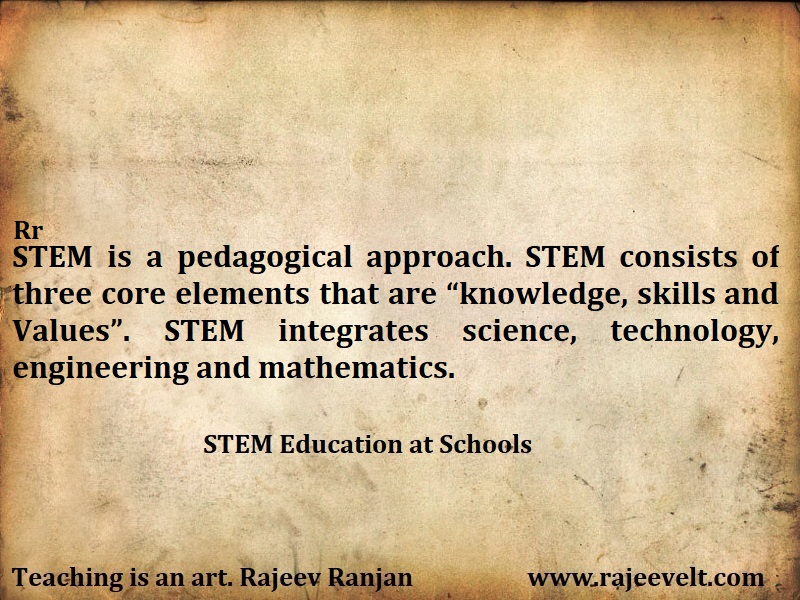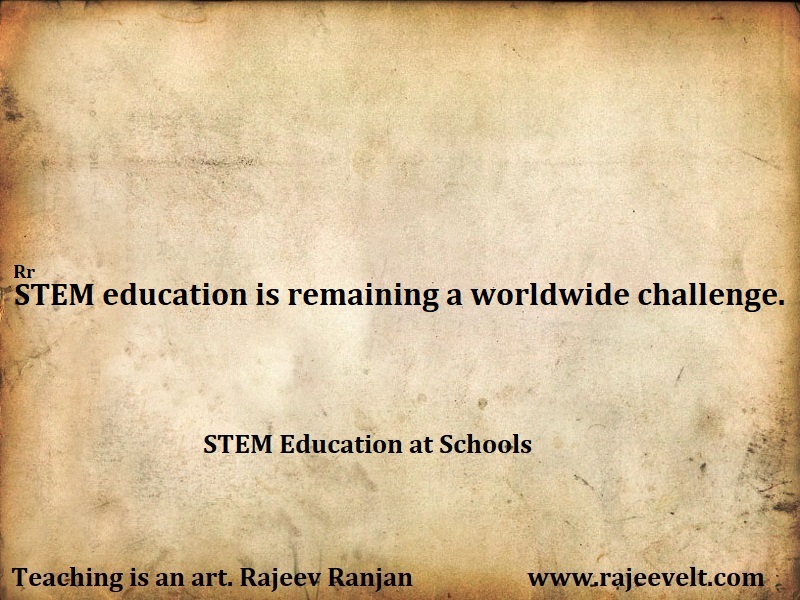STEM Education -Its Challenges Importance and Benefits at School Education
Key Words: – STEM Education, Pedagogy, STEM Education Syllabus, STEM Education Challenges, STEM Education Importance, STEM Education Benefits, Coding, Artificial Intelligence, Big Data, Machine Learning, Career in STEM Education, Opportunity in STEM Education

STEM is a pedagogical approach. STEM consists of three core elements that are “knowledge, skills and Values”. STEM integrates science, technology, engineering and mathematics. Living in a VUCA world demands more skills and an integrated approach to handling different challenges as well as responds and resolves them quickly. STEM is an integrated approach of learning.

STEM education is remaining a worldwide challenge. We have been observing the fastest use of technological automation for a long time. Human laborers are being replaced or substituted by increasing use of machines, algorithms, big data, artificial intelligence etc. These developments put big challenges to developing countries as well as developing countries.

New jobs are there but new skills will require handling the new role and responsibility of the job. Experts say that 75-80 % of job opportunities will be created in the field of science, technology, engineering and mathematics. Coming generation will require the different skills and competencies to establish, succeed and grow.
Asian Development Bank Institute stated in “Realizing Education For All-In the Digital Age” that “the challenges are twofold: to achieve the spread of access to high-quality education to all, and to rethink education in a way that enables all people to deal with this rapidly changing environment in both their work and social lives.”
Teachers’ in STEM Education System
Teachers are indeed at the center for delivering quality education for 21st century generation kids. 21st century teachers should have should have depth content knowledge and pedagogical skills. Teachers should have professional competencies to be able to implement effective teaching learning process. Professional competencies can be developed and nurtured through “Continuous Professional Development” programe by using information and communication technology.
Schooling systems are not fully prepared to take on this challenge for the better future of 21st century learners; however we need great and quick initiative to do so.
STEM Education and Sustainable Development Goal 2030
The United Nations General Assembly adopted the agenda of “Sustainable Development 2030”. It gives emphasis in finding solutions for moving towards a sustainable, equitable and prosperous globalized world. Development Goal-4 designed by the United Nations General Assembly in 2015 “ ensures inclusive and quality education for all and promotes lifelong learning. Development Goal-4 emphasizes the relevance of Science, Technology, Engineering and Mathematics (STEM) for promoting sustainable development and sustainable lifestyles.
STEM Education and 21st Century Skills
21st century world needs more skilled, more proficient and more efficient manpower. We are living in a fast growing world. STEM creates skilled man power who perceives challenge as an opportunity. Industries are looking for STEM skilled manpower. Jobs exist but the nature of jobs has changed in 21st century due to technological advancement.
Computer literacy was more demanding in the 2010 decade, but we are looking for Coding, AI and other things. STEM shapes a learner to succeed at school and beyond the educational world. STEM provides strong foundation skills in science and mathematics. STEM develops critical analysis, creativity and problem solving skills among students. STEM prepares students to take initiative, work in a team and lead the team as a visionary leader.
STEM Education at School
School integrates STEM activities across learning areas which are suitable to age appropriate and appropriate to students learning temperament. STEM provides adequate learning opportunities to explore and to develop different skills to survive in 21st century VUCA world. Generally industries are looking for analytical skills, scientific skills, mathematical skills and technical skills from graduates for leading the institutions in more productive ways.
Emerging careers in STEM fields
A large number of emerging careers in STEM fields are open for students across the world. Students have en number of career opportunities in the field of “environmental studies, other natural and physical sciences, fisheries studies, engineering and its related technologies, information technology, earth sciences, forestry studies, biological sciences, agriculture, horticulture etc, therefore 21st century are looking forward for more qualified and skilled persons in the areas of science, technology, engineering and mathematics.
STEM helps students to develop expertise in the various fields especially animal production systems, aviation, marine and maritime studies, plant production systems, applied information technology, automotive engineering and technology, building and constructions, material design and technology, primary industries, mathematics specialist, mathematics applications etc.
STEM –a Multidisciplinary and Interdisciplinary Education System
STEM promotes a multidisciplinary and interdisciplinary education system. STEM education involves different age group learners to handle the challenges of life. It can be national, international or at local level i.e. developing technology enables systems in health care, mental health, environmental, conservation of water, solar energy, pollution or understanding human brains etc.
21st century students require a positive attitude for lifelong learning.
21st century students require a positive attitude for lifelong learning. Today it is required to be a knowledge hunger and skill hunter. It is required to have resilience and agility for leading an organization. STEM prepares an individual to be an integrated skilled professional. STEM prepares 21st century students to become skilled human power. STEM provides flexible learning space for different learning activities. STEM invites creativity, collaboration, discovery, co-discovery and space as well as exposure for experimentation in an instructor –guided environment.
Core conceptual knowledge and skills
Students need to acquire a new set of core conceptual knowledge and skills to solve difficult problems and challenges. Students need to gather and evaluate information, evidence and other crucial things to find rational solutions. The STEM education system helps students to develop these skills and prepare them for the organizations. It is observed in the recent job trends that the need for STEM knowledge and skills will be more demanding in the future.
Cognitive skills and abilities
STEM education helps to develop cognitive knowledge, skills, and abilities which are in fact in demand in almost all job sectors. A school needs to develop a good system to promote STEM in the school. A School needs to invest on developing good infrastructure for imparting technological based education system. It is high time to train our young mind for building a new scope for the nation.
Author-
Rajeev Ranjan
Principal, Teacher Trainer and Career Counselor
CEO-School Education



